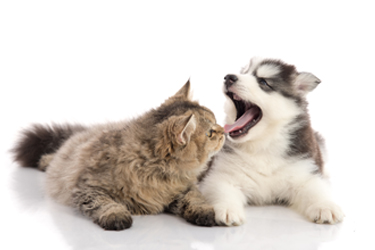Client Info: Preventive Dental Care Checkups for Pets

Maintaining good oral health is important to the general well-being of a pet. Left untreated, oral and/or dental diseases can cause an animal to experience severe pain and shorten its life. Clients need to be aware of what is involved in veterinary dental care checkups.
In addition, dentistry has been identified as an aspect of veterinary practice in need of upgrading in most small animal hospitals. By reminding your clients about their pet’s dental health, not only do you improve their health, you may drive more business to your practice.
Oral health problems can cause harm to a pet in the same way as they may to an owner. For example, plaque, gingivitis, and tooth loss are commonly seen by both dentists and veterinarians. In fact, gum disease, which can cause severe dental problems, is found to occur five times more often in animals than in people.
Periodontal Disease
Many of the dental problems observed in animals begin with plaque. As in a human mouth, plaque forms on the animal’s teeth after it eats food. When left untreated, plaque causes harm to the oral health of an animal by:
- Increased and continued deposits of plaque and bacteria on the teeth and along the gum line
- Gingivitis, which forms pockets of bacteria and loosens the gum line
- Periodontitis, which breaks down the cementum and periodontal membranes that hold the teeth in place
- Loosened teeth.
The end result of periodontal disease is inflammation of the bone and loss of the tooth. As the animal’s oral health worsens, symptoms of disease will include problems such as the following:
- Chronic pain
- Severe inflammation
- Abscesses
- Loss of bone
- Loss of teeth.
Pain
Often, when either dogs or cats are brought in for examination, owners are caught unaware that their pets have been suffering. While often a result of dental issues, pain is viewed as a sign of weakness, and animals instinctively try to hide their discomfort.
Clients need to know to also watch for these signs of oral and/or dental disease:
- Chronic halitosis
- Discolored teeth
- Tartar-covered teeth
- Changes in way animal eats or observed difficulties in eating, including:
- Dropping food from the mouth
- Picking up or eating food only from one side
- Normal appetite, but shows a reluctance to eat
- Swallowing food without chewing
- Bleeding from the mouth
- Appearing head shy when being petted on the head
- Loss of weight.
Any of these symptoms point to the need for the pet to receive a veterinarian’s attention.
Preventive Care Check Ups
Common dental preventive care provided through the veterinarian would consist of:
- Oral X-rays
- Regular dental examinations
- Routine dental cleanings.
During a dental visit, the veterinarian will initially check the animal for:
- Signs of gum disease, which includes:
- Odor
- Irritated or inflamed gums
- Bleeding gums
- Teeth that are:
- Discolored
- Broken
- Loose
- Missing
- Receding gumline.
However, in order to complete the examination and clean the teeth, the veterinarian will require that the animal receive general anesthesia. Once the animal is under, the full examination will include:
- Checking for periodontal disease, including
- Gingivitis under the gum line
- Any formation of periodontal pockets around the teeth
- Examining the surfaces of the animal’s teeth
- Completing X-rays
- Information important to diagnose any dental disease or damage below the gum line
- Evaluating the animal’s mouth to check for:
- Malocclusions
- Damage to any soft tissue or palate.
During the examination, the veterinarian will also look for any issues involving the:
- Tonsils
- Tongue
- Lips
- Cheek tissue
- Jaw
- TMJ joint
- Lymph nodes.
History
A history of the veterinarian’s examination findings will be documented. This information helps to track the changes of the animal’s mouth over time. It also provides important data that enables the veterinarian to establish a plan for any future preventive dental care needs.
Remind your clients that working with you to establish routine dental care for a pet will benefit the animal’s overall health and well-being regardless of its age.
Contact your Covetrus North America representative for information on products that help control dental disease at 855.724.3461.
Need Regulatory Assistance
If you need help with regulatory or licensing issues, we're happy to help. We have a wide variety of resources to help you when issues arise.

Careers
Are you looking for a place to let your talents shine? At Covetrus, we help our practitioner customers better serve their patients and take pride in providing the best customer experience possible. Search our open positions to see our available opportunities.
Newsletter
Stay current with what’s going on with Covetrus, subscribe to receive our newsletter and email communications. Subscribers will receive the latest information in practice management, sales and marketing, animal health, and more.


Leave a comment